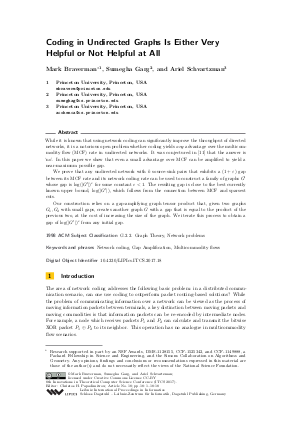Coding in Undirected Graphs Is Either Very Helpful or Not Helpful at All
Authors Mark Braverman, Sumegha Garg, Ariel Schvartzman
-
Part of:
Volume:
8th Innovations in Theoretical Computer Science Conference (ITCS 2017)
Part of: Series: Leibniz International Proceedings in Informatics (LIPIcs)
Part of: Conference: Innovations in Theoretical Computer Science Conference (ITCS) - License:
 Creative Commons Attribution 3.0 Unported license
Creative Commons Attribution 3.0 Unported license
- Publication Date: 2017-11-28
File

PDF
LIPIcs.ITCS.2017.18.pdf
- Filesize: 0.8 MB
- 18 pages
Document Identifiers
Subject Classification
Keywords
- Network coding
- Gap Amplification
- Multicommodity flows
Metrics
- Access Statistics
-
Total Accesses (updated on a weekly basis)
0PDF Downloads0Metadata Views
Abstract
While it is known that using network coding can significantly improve the throughput of directed networks, it is a notorious open problem whether coding yields any advantage over the multicommodity flow (MCF) rate in undirected networks. It was conjectured that the answer is no. In this paper we show that even a small advantage over MCF can be amplified to yield a near-maximum possible gap. We prove that any undirected network with k source-sink pairs that exhibits a (1+epsilon) gap between its MCF rate and its network coding rate can be used to construct a family of graphs G' whose gap is log(|G'|)^c for some constant c < 1. The resulting gap is close to the best currently known upper bound, log(|G'|), which follows from the connection between MCF and sparsest cuts. Our construction relies on a gap-amplifying graph tensor product that, given two graphs G1,G2 with small gaps, creates another graph G with a gap that is equal to the product of the previous two, at the cost of increasing the size of the graph. We iterate this process to obtain a gap of log(|G'|)^c from any initial gap.
Cite As Get BibTex
Mark Braverman, Sumegha Garg, and Ariel Schvartzman. Coding in Undirected Graphs Is Either Very Helpful or Not Helpful at All. In 8th Innovations in Theoretical Computer Science Conference (ITCS 2017). Leibniz International Proceedings in Informatics (LIPIcs), Volume 67, pp. 18:1-18:18, Schloss Dagstuhl – Leibniz-Zentrum für Informatik (2017)
https://doi.org/10.4230/LIPIcs.ITCS.2017.18
BibTex
@InProceedings{braverman_et_al:LIPIcs.ITCS.2017.18,
author = {Braverman, Mark and Garg, Sumegha and Schvartzman, Ariel},
title = {{Coding in Undirected Graphs Is Either Very Helpful or Not Helpful at All}},
booktitle = {8th Innovations in Theoretical Computer Science Conference (ITCS 2017)},
pages = {18:1--18:18},
series = {Leibniz International Proceedings in Informatics (LIPIcs)},
ISBN = {978-3-95977-029-3},
ISSN = {1868-8969},
year = {2017},
volume = {67},
editor = {Papadimitriou, Christos H.},
publisher = {Schloss Dagstuhl -- Leibniz-Zentrum f{\"u}r Informatik},
address = {Dagstuhl, Germany},
URL = {https://drops.dagstuhl.de/entities/document/10.4230/LIPIcs.ITCS.2017.18},
URN = {urn:nbn:de:0030-drops-81599},
doi = {10.4230/LIPIcs.ITCS.2017.18},
annote = {Keywords: Network coding, Gap Amplification, Multicommodity flows}
}
Author Details
References
-
M. Adler, N. J. A. Harvey, K. Jain, R. Kleinberg, and A. Rasala Lehman. On the capacity of information networks. In Proceedings of the Seventeenth Annual ACM-SIAM Symposium on Discrete Algorithm, SODA '06, pages 241-250, Philadelphia, PA, USA, 2006. Society for Industrial and Applied Mathematics.

-
Rudolf Ahlswede, Ning Cai, S-YR Li, and Raymond W Yeung. Network information flow. IEEE Transactions on information theory, 46(4):1204-1216, 2000.

-
R. K. Ahuja, T. L. Magnanti, and J. B. Orlin. Network Flows: Theory, Algorithms, and Applications. Prentice-Hall, Inc., Upper Saddle River, NJ, USA, 1993.

-
Anna Blasiak, Robert Kleinberg, and Eyal Lubetzky. Lexicographic products and the power of non-linear network coding. In Foundations of Computer Science (FOCS), 2011 IEEE 52nd Annual Symposium on, pages 609-618. IEEE, 2011.

-
C. Fragouli and E. Soljanin. Network coding applications. Found. Trends Netw., 2(2):135-269, January 2007.

-
Z. Furedi, F. Lazebnik, A. Seress, V. A. Ustimenko, and A. J Woldar. Graphs of prescribed girth and bi-degree. Journal of Combinatorial Theory, Series B, 64(2):228-239, 1995.

-
N. J. A. Harvey, R. Kleinberg, and A. Rasala Lehman. Comparing network coding with multicommodity flow for the k-pairs communication problem, 2004.

-
K. Jain, V. V. Vazirani, and G. Yuval. On the capacity of multiple unicast sessions in undirected graphs. IEEE/ACM Trans. Netw., 14(SI):2805-2809, June 2006.

-
G. Kramer and S. A. Savari. Edge-cut bounds on network coding rates. J. Netw. Syst. Manage., 14(1):49-67, March 2006.

-
T. Leighton and S. Rao. Multicommodity max-flow min-cut theorems and their use in designing approximation algorithms. J. ACM, 46(6):787-832, November 1999.

-
Z. Li and B. Li. Network coding in undirected networks, 2004.

-
Z. Li, B. Li, D. Jiang, and L. C. Lau. On achieving optimal throughput with network coding. In INFOCOM 2005. 24th Annual Joint Conference of the IEEE Computer and Communications Societies, 13-17 March 2005, Miami, FL, USA, pages 2184-2194, 2005.

-
M. Medard and A. Sprintson. Network Coding: Fundamentals and Applications. Academic Press. Elsevier, 2012.

-
R. W. Yeung. Information theory and network coding. Springer Science &Business Media, 2008.

-
R. W. Yeung, S.-Y. R. Li, N. Cai, and Z. Zhang. Network coding theory: Single sources. Commun. Inf. Theory, 2(4):241-329, September 2005.

